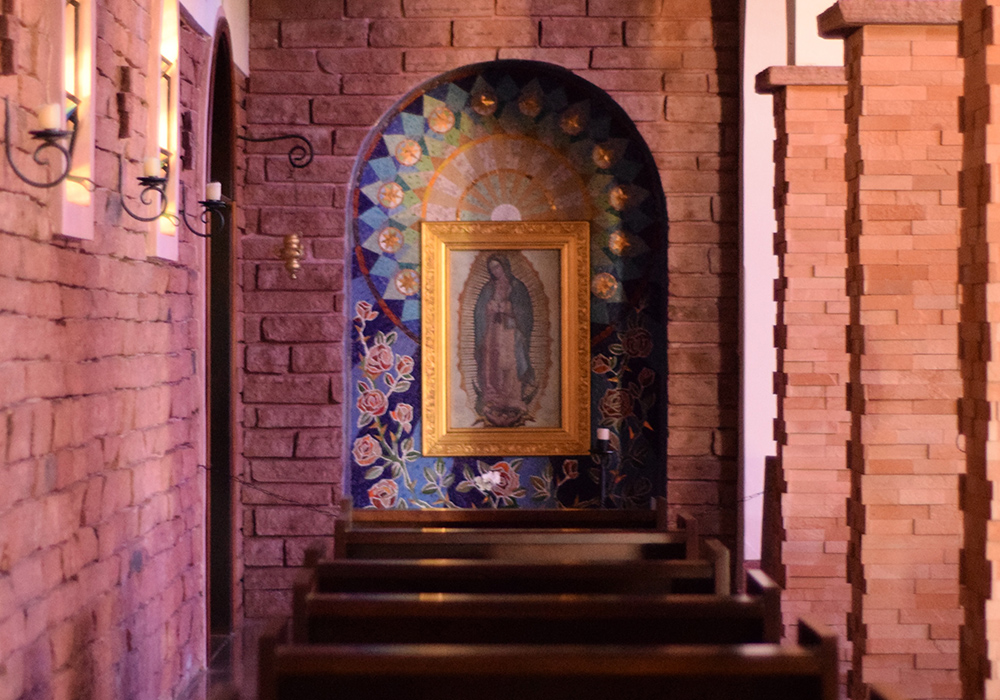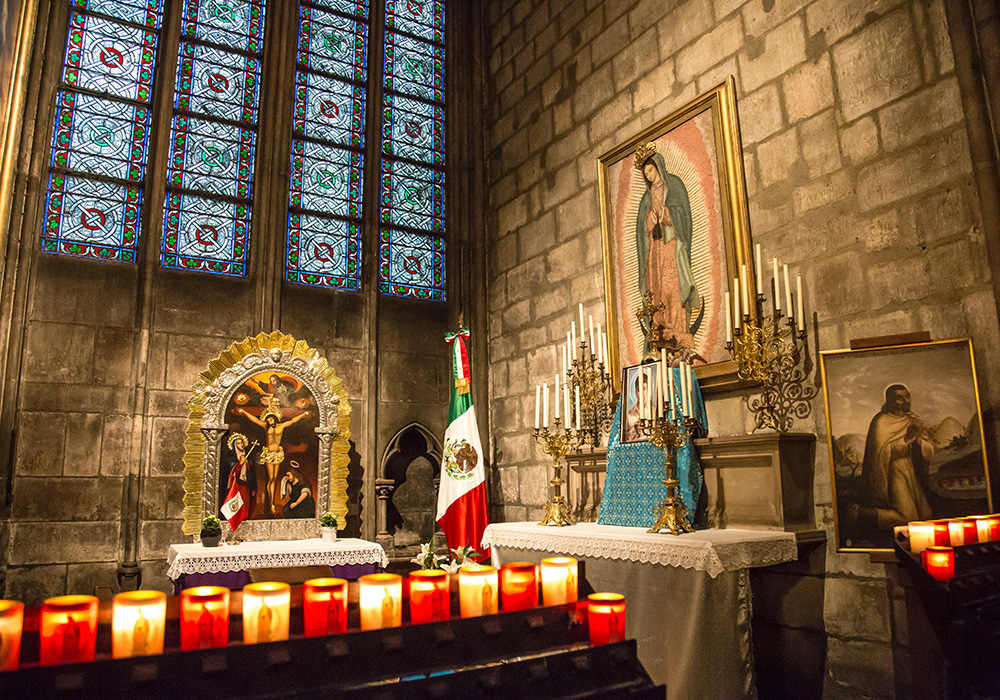
(Unsplash/Antonia Felipe)
In my family, my grandma Mercedes — my "Mimi" — is La Reina of the Alfaros. Some of my earliest memories are of her sitting on the couch in our living room surrounded by her grandchildren with the TV blaring and a bright blue plastic rosary slowly moving through her fingers. Even now, her prayers quietly pulse through the family. Her altars burst with family photos between statues of Mary and crucifixes, a glimpse into the stories of who we are — and from whom we come. Greetings and departures are marked with blessings: She makes a point of reapplying her bright red lipstick to stain us with her kisses and places invisible crosses on our foreheads with her thumb as we leave her. Sacred practices tell us that we are loved and that we belong in this wild, sprawling family tree.
Every family is plagued with trauma and history; mine is no different. It had to have been her faith and prayers that have carried her — and us — all this way: through death as she lost her first husband and only daughter; through strife as she accompanied her six sons through loss of businesses, homes and loved ones to natural disasters, civil war and political violence; and through risk as she courageously moved across borders to save her family from destruction.
Even now with nearly 40 great-great-grandchildren, Mimi is no stranger to dancing, laughter and maybe a little too much to drink. This family has a formidable queen who has shown us that femininity demands strength, perseverance and respect as much as it radiates warmth and passion (both of the sultry and the matronly varieties). So it was never hard for me to imagine that Our Lady was given to the church to teach a similar truth: that not only is the fullness and complexity of women necessary for God's creation to continue to unfold, but women's intelligence and power usher God into and through life.
Although much of Latin America was colonized first by Europeans and arguably again by US-backed trade agreements and military coups, there are still strong cultural roots tied to indigenous practices that continue to persist. It's true that machismo is rampant throughout Latin American culture, but it is also true that families are far more matriarchal than what we find in the U.S. — a legacy passed on from our indigenous ancestors.
Too often the generational wisdom of women is distilled into stereotypical themes of child-rearing and healing foods, but it's more than that: It's an understanding of the power that comes with femininity, a power that is different from patriarchal power.
Too often the generational wisdom of women is distilled into stereotypical themes of child-rearing and healing foods, but it's more than that: It's an understanding of the power that comes with femininity, a power that is different from patriarchal power. We call out to our mothers to rely on their intuition so we can learn to rely on our own. Through their example, we learn the ways of our bodies and how to move them to the rhythm of our own internal music.
Latinas are confused when the inherited messages of our ancestors — the ones that tell us our bodies are powerful and sexy (or even just good at all) — come up against the colonized shame that leaves us wondering if maybe our bodies are too powerful, too sexy, too good. We call out to our feminine lineage, asking how to heal this. How do we find reconciliation in a world that commodifies our culture but does not want our wisdom?
Advertisement
The Virgin Mary was used as a symbol of female empowerment in many of the feminist movements throughout Latin America. The message was that if we can recognize Mary as a protector, a mother, a liberator — an image worth venerating — then we can see that society fairs better when women have formal roles in civil life. After all, where would we be without the mother of God?
Mothers and grandmothers have led social movements, like Las Madres de la Plaza de Mayo in Argentina, calling for their lost children to be returned. La Virgen de Guadalupe was a key symbol in the fight for workers' rights in the United Farm Workers movement in the United States, led not only by Cesar Chavez but also by Dolores Huerta, a fierce negotiator — and mother of 11 children. The mothers of Juarez march under images of La Virgen demanding justice for their daughters, victims of femicide. We must teach our daughters to keep going, to carry our stories and honor our culture; to remember the ancestors whose prayers are still pulsing through our veins. Because if trauma can persist through generations, how much longer can ancestral healing prayers persevere?

(Unsplash/Emmanuel Acua)
A few days after the birth of my fourth child, my third daughter, one of my Latina midwives held ceremonia to plant the placenta. For me, it was a meaningful syncretism, the intertwining of ancestral symbols and traditions with our Catholic faith. We offered gratitude to Creator for nourishing me and the baby throughout my pregnancy. We venerated La Virgen de Guadalupe, thanking her for her prayers through labor and delivery. My midwife shared with me that she asked La Virgen to guide her and bless us before she entered my home the morning of the baby's birth.
This ceremonia was a holy space, reminding us that to be feminine is to hold sacred wisdom to pass on to future generations. To be feminine is to guide family through trials and celebrations. To offer a soft place to land; to offer protection. This is what my grandmother has offered to our family throughout her life. This is what Mary has done repeatedly in her apparitions; revealing herself as culturally relevant to her people, sharing in their sorrow, speaking to their concerns, providing comfort and a promise for moving forward. This, too, is what I hope to offer my family.
Latina spirituality teaches women that whether we are mothers to children, spiritual mothers or mothers through friendship, we can harness the complexity and fullness of femininity to honor our Creator.









